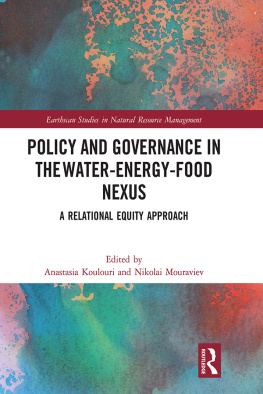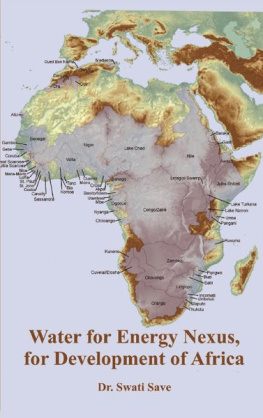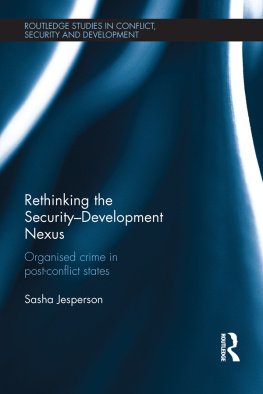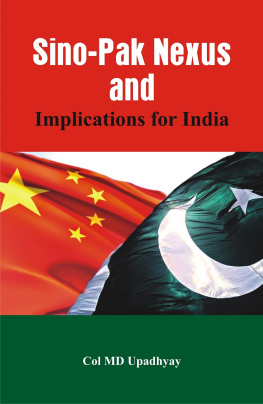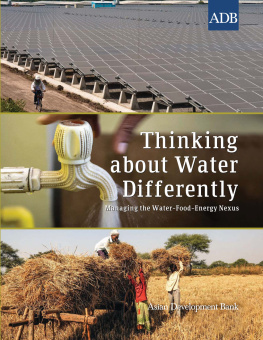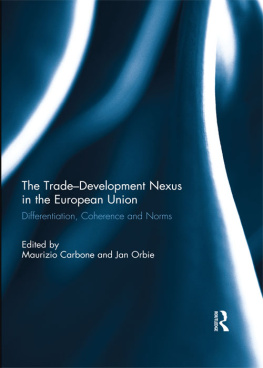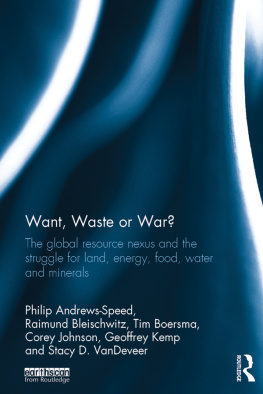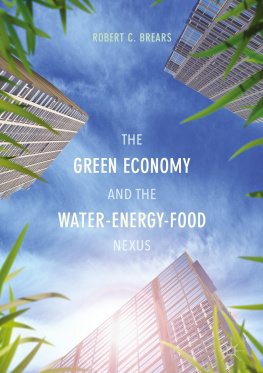Policy and Governance in the Water-Energy-Food Nexus
This book discusses the balance of priorities within the Water-Energy-Food (WEF) nexus and its impact on policy development and implementation, highlighting innovative perspectives in adopting a holistic approach to identify, analyse and manage the nexus component interdependencies.
Due to increasing demands for natural resources, the WEF nexus has emerged as a response to the numerous global challenges. Addressing WEF challenges often involves balancing multiple and competing priorities and identifying and managing interrelations, synergies and trade-offs between the three components of the nexus. In this volume the authors focus on the dynamics between multiple stakeholders, such as governments, businesses, NGOs and local communities, when addressing WEF challenges by adopting a nexus approach. The book argues that effective engagement of multiple stakeholders can address difficulties arising from the introduction of an integrated approach to WEF policy design and implementation, increasing the potential benefits. The book also looks at the effect of international relations and regional power struggles on resolving cross-border WEF nexus issues. Case studies are drawn from Kenya, Central Asia, USA and Peru, highlighting key themes, such as how collaborative governance, enabled and facilitated by relational equity management, can be viewed as an innovative way to reconcile competing priorities.
The combination of theoretical and case study chapters makes the book of interest to a wide audience, including scholars and advanced students of sustainable development, agriculture and food studies, water and energy policy design and governance, as well as to practitioners working in the fields of water, energy and food security.
Anastasia Koulouri graduated from the University of Strathclyde, UK with a PhD in Management Science. Previously she has held posts at the University of Strathclyde, UK, the Technical University of Helsinki, Finland and the Belgian Nuclear Energy Research Centre, Belgium. Currently she is a Lecturer at the School of Business, Law and Social Sciences, Abertay University, UK.
Nikolai Mouraviev is a Senior Lecturer at the School of Business, Law and Social Sciences, Abertay University, UK. Previously he has held teaching positions at KIMEP University, Kazakhstan, Wayne State University, USA and Viterbo University, USA.
Earthscan Studies in Natural Resource Management
For more information on books in the Earthscan Studies in Natural Resource Management series, please visit the series page on the Routledge website: http://www.routledge.com/books/series/ECNRM/.
Agricultural Land Use and Natural Gas Extraction Conflicts
A Global Socio-Legal Perspective
Madeline Taylor and Tina Hunter
Tropical Bioproductivity
Origins and Distribution in a Globalized World
David Hammond
The Commons in a Glocal World
Global Connections and Local Responses
Edited by Tobias Haller, Thomas Breu, Tine De Moor, Christian Rohr, Heinzpeter Zonj
Natural Resource Conflicts and Sustainable Development
Edited by E. Gunilla Almered Olsson and Pernille Gooch
Sustainable Governance of Wildlife and Community Based Natural Resource Management
From Economic Principles to Practical Governance
Brian Child
Sustainability Certification Schemes in the Agricultural and Natural Resource Sectors
Outcomes for Society and the Environment
Edited by Melissa Vogt
Policy and Governance in the Water-Energy-Food Nexus
A Relational Equity Approach
Edited by Anastasia Koulouri and Nikolai Mouraviev
UNESCO Biosphere Reserves
Supporting Biocultural Diversity, Sustainability and Society
Edited by Maureen G. Reed and Martin F. Price
First published 2020
by Routledge
2 Park Square, Milton Park, Abingdon, Oxon OX14 4RN
and by Routledge
52 Vanderbilt Avenue, New York, NY 10017
Routledge is an imprint of the Taylor & Francis Group, an informa business
2020 selection and editorial matter, Anastasia Koulouri and Nikolai Mouraviev; individual chapters, the contributors
The right of Anastasia Koulouri and Nikolai Mouraviev to be identified as the authors of the editorial material, and of the authors for their individual chapters, has been asserted in accordance with sections 77 and 78 of the Copyright, Designs and Patents Act 1988.
All rights reserved. No part of this book may be reprinted or reproduced or utilised in any form or by any electronic, mechanical, or other means, now known or hereafter invented, including photocopying and recording, or in any information storage or retrieval system, without permission in writing from the publishers.
Trademark notice: Product or corporate names may be trademarks or registered trademarks, and are used only for identification and explanation without intent to infringe.
British Library Cataloguing in Publication Data
A catalogue record for this book is available from the British Library
Library of Congress Cataloging-in-Publication Data
A catalog record has been requested for this book
ISBN: 978-1-138-35737-2 (hbk)
ISBN: 978-0-429-42771-8 (ebk)
Anastasia Koulouri
To Nikolas, my little star.
You are absolutely amazing!
Always remember, mum loves you to Pluto and beyond!
Dr Anastasia Koulouri graduated from the University of Strathclyde, UK with a PhD in Management Science. Previously she has held posts at the University of Strathclyde, UK, the Technical University of Helsinki, Finland and the Belgian Nuclear Energy Research Centre, Belgium. Currently she is a Lecturer at the School of Business, Law and Social Sciences, Abertay University, UK. Her research interests include energy security in resource-rich countries and sustainable development of transitional economies.
Dr Nikolai Mouraviev is a Senior Lecturer at the School of Business, Law and Social Sciences, Abertay University, UK. Previously he has held teaching positions at KIMEP University, Kazakhstan, Wayne State University, USA and Viterbo University, USA. His research focuses on public-private collaboration in transitional nations. In addition, his research interests include entrepreneurship in cosmopolitan cities and governance of the energy sector.
Aigul Adibayeva is Associate Dean of the College of Social Sciences, KIMEP University, Almaty, Kazakhstan. Her research interests are in the field of politics in Central Asia.
Jeremiah Ogonda Asaka is Assistant Professor of Security Studies at Sam Houston State University, Texas, USA. He holds a PhD in Global Governance and Human Security from the University of Massachusetts, Boston, USA.
Livia Bizikova is a Director at the International Institute of Sustainable Development (IISD) based in Ottawa, Canada. Her expertise focuses on policy implications of and tracking progress on issues such as the water-energy-food nexus, sustainability, the Sustainable Development Goals, food security and climate change.
Dr Jonathan C. Cooper is Senior Lecturer in Sustainable Technology and Geography at Harper Adams University, Shropshire, United Kingdom. His research interests include energy policy, especially related to on-farm installations, agricultural innovation and sustainable development.

